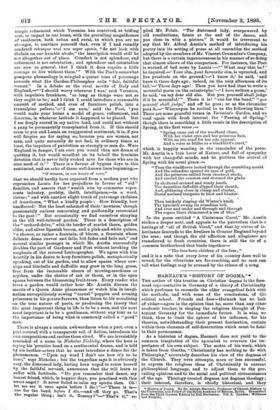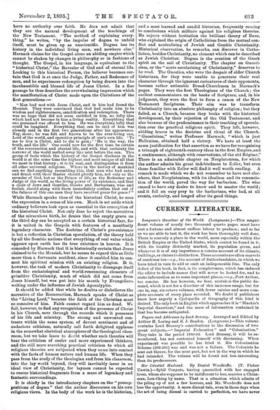HARNACK'S "HISTORY OF DOGMA."* THE author of this treatise on
Christian dogma is the fore- most representative in Germany of a theory of Christianity which professes to reconcile the older evangelical faith with the methods, and with some of the conclusions, of the critical school. Friends and foes—Harnack has no lack of either—agree in the opinion that he, more than any other academic teacher, is shaping the religious thought of Pro- testant Germany for the immediate future. It is wise, we think, thus to limit the sphere of his influence, for his theories, notwithstanding their present fascination, contain within them elements of self-destruction which must be fatal to their permanence.
As a historian of dogma, Harnack does not yield to the common temptation of the specialist to overrate the im- portance of his own subject. The motto of his work, which is taken from Goethe, " Christianity has nothing to do with Philosophy," accurately describes his view of the dogmas of the Church. They were attempts, more or less successful, to express the religious ideas of Christianity in current philosophical language, and to adjust them to the pre- vailing opinions and to the social and political circumstances of the age. Theology created dogmas, not dogmas theology ; their interest, therefore, is chiefly historical, and they
• History of Dogma. By Dr. Adolph Harnack, Professor of Church History in the University. and Fellow of the Royal Academy of Science, Berlin. Translated from the Third German Edition by Neil Buchanan. VoL L London : Williams and Norgatc.
have no authority over faith. He does not admit that they are the natural development of the teachings of
the New Testament. " The method of explaining every- thing," he writes, " by the impulse of dogma to unfold itself, must be given up as unscientific. Dogma has its history in the individual living man, and nowhere else." Harnack claims for the Gospel alone an abiding empire which cannot be shaken by changes in philosophy or in fashions of
thought. The Gospel, in his language, is equivalent to the
"historical Christ," the Revealer of God and of eternal life. Looking to this historical Person, the believer becomes cer-
tain that God is at once the Judge, Father, and Redeemer of men, and he experiences redemption by being drawn into the inexhaustible and blessed life of Jesus Christ. In a fine passage he thus describes the overwhelming impression which the manifestation of Christ made upon the Christians of the first generations :-
" Men had met with Jesus Christ, and in him had found the Messiah. They were convinced that God had made him to be wisdom and righteousness, sanctification and redemption. There was no hope that did not seem certified in him, no lofty idea which had not become in him a living reality. Everything that one possessed was offered to him. He was everything lofty that could be imagined. Everything that can be said of him was already said in the first two generations after his appearance. Nay, more ; he was felt and known to be the ever-living one, Lord of the world, and operative principle of one's own life. ' To me to live is Christ, and to die is gain; "He is the way, the truth, and the life.' One could now for the first time be certain of the resurrection and eternal life, and with that certainty the sorrows of the world melted away like mist before the sun. This group of facts which the history of the Gospel discloses in the world is at the same time the highest and most unique of all that we meet in that history ; it is its seal, and distinguishes it from all other universal religions. Where in the history of mankind can we find anything resembling this, that men who had eaten and drunk with their Master should glorify him, not only as the revealer of God, but as the Prince of life, as the Redeemer and Judge of the world, as the living power of its existence, and that a choir of Jews and Gentiles, Greeks and Barbarians, wise and foolish, should along with them immediately confess that out of the fulness of this one man they have received grace for grace "
While Harnack speaks thus of the historical Christ, he uses the expression in a sense of his own. Much is set aside which ordinary believers look upon as essential to the conception of the historical Christ. Not only does he reject the-narratives
of the miraculous birth, he denies that the empty grave on the third day can be accepted as a certain historical fact, for
it is united in the Gospels with features of a manifestly legendary character. The doctrine of Christ's pre-existence is but a reflection in Christian speculation, of the theory held by all the Semitic nations that everything of real value which appears upon earth has its true existence in heaven. It is conceded by Harnack that it is historically certain that Jesus claimed to be the Messiah, but he seems to regard this as little more than a fortunate accident, since it enabled him to con- nect his spiritual mission with an existing religion. It is, however, the task of modern Christianity to disengage itself from the eschatological and world-renouncing elements of primitive Christianity, much of which did not come from Jesus himself, but was put into his month by Evangelists, writing under the influence of Jewish Apocalyptic.
It should be added that while he doubts or disbelieves the narrative of the Resurrection, Harnack speaks of Christ as the "Living Lord," because the faith of the Christian must eo conceive of him. Faith cannot regard him as dead. We fail, however, to find any recognition of the presence of Christ in his Church, save through the records which it possesses of his life and ministry. The strong and unwonted con- trasts within the same system, of devout sentiment and of audacious criticism, naturally call forth delighted applause in the somewhat electrical atmosphere of the theological class- room, but we take leave to doubt whether such theories will bear the criticism of cooler and more experienced thinkers, and the still more searching practical criticism to which all religious theories are subjected when they come into contact with the facts of human nature and human life. When they pass from the study of the theologian and from his classroom, into the lay world beyond, they will inevitably issue in an ideal view of Christianity, for laymen cannot be expected to rescue historical fragments from a mass of legeniary and fantastic surroundings.
It is chiefly in the introductory chapters on the " presup- positions of dogma" that the author discourses on his own religious views. In the body of the work he is the historian, and a most learned and candid historian, frequently coming to conclusions which militate against his religious theories. He rejects without hesitation the brilliant theory of Baur, who explained the origin of Catholicism from the mutual con- flict and neutralising of Jewish and Gentile Christianity. Historical observation, he remarks, can discover in Catho- licism, besides Christianity, no element which can be described as Jewish Christian. Dogma is the creation of the Greek spirit on the soil of Christianity. The chapter on Gnosti- cism, or the " acute secularising of Christianity," deserves to be read. The Gnostics, who were the despair of older Church historians, for they were unable to penetrate their real character through the ignorant caricatures of their opponents, become rather estimable Broad-Churchmen in Harnack's pages. They were the first Theologians of the Church; the earliest commentators on the books of Scripture, and, in his judgment, they were the first to form a canon of the New Testament Scriptures. Their aim was to transform Christianity into an absolute philosophy of religion ; but they failed, as a Church, because they broke with the historical development, by their rejection of the Old Testament, and also because of the predominance in their teaching of specula- tion over the practical religious spirit. They left, however, abiding traces in the doctrine and ritual of the Church. "Gnosticism," writes Professor Harnack, "which is just Hellenism, obtained half a victory. We have at least the same justification for that assertion as we have for recognising a triumph of eighteenth-century ideas in the first Empire, and a continuance, although with reservations, of the old R4gime." There is an admirable chapter on Neoplatonism, for which the author admits his great indebtedness to Zeller, but even those familiar with Zeller will find it well worth reading. A remark is made which we do not remember to have met else- where, that Neoplatonism, with its idealism and its renuncia- tion of the world, paved the way for barbarism. The wise ceased to have any desire to know and to master the world; and it fell an easy prey to the barbarians, who had, at all events, curiosity, and longed after its good things.



















































 Previous page
Previous page